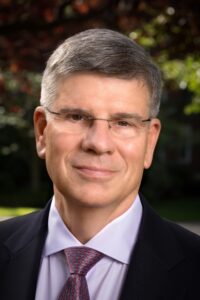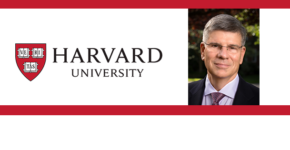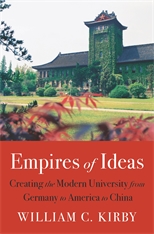 Just because you’re the best now, doesn’t mean you always will be.
Just because you’re the best now, doesn’t mean you always will be.
William C. Kirby, T. M. Chang professor of China Studies at Harvard University and Spangler Family Professor or Business Administration at Harvard Business School, details how American academic leadership may be threatened.
William C. Kirby is T. M. Chang Professor of China Studies at Harvard University and Spangler Family Professor of Business Administration at the Harvard Business School. He is the author of Empires of Ideas: Creating the Modern University from Germany to America to China
(Harvard University Press, 2022). Follow him on Twitter @BillKirbyHBS.
The End of American Academic Leadership
What makes a country powerful? Armies? Navies? Or the realm of ideas? In modern times, the influence of a nation can be measured by the strength of its universities. My work chronicles the rise and fall of great universities as nations compete in a world of knowledge. Through a series of case studies, I investigate three systems of higher education that have defined or promised to define, excellence in higher education over the past two centuries. The modern research university was born in Germany in the 19th century, propelling it to the forefront of science and power. In the twentieth century, the United States leapfrogged Germany to become the global leader in higher education. Today, American institutions dominate nearly every major ranking of global universities. However, America’s supremacy in higher education is under great stress, particularly at its public universities. At the same time, Chinese universities are on the ascent. Today, no country invests more in higher education and research than China. Will China threaten American primacy in the 21st century?
Public institutions in the United States educate three-quarters of all American university students. However, 43 of 50 states have disinvested in higher education since 2008. This slow-motion defunding of US public higher education will also hurt our famous private universities. After all, they compete for the same faculty, graduate students, and senior administrators. Competition—in education as in any business—is a key to excellence.
Meanwhile, China has shown an unmatched ambition to build more of the best, ‘world-class’ universities, with now more than forty million students. To this effort, China has mobilized both state and private resources, and it has more of the best human capital available—Chinese scholars at home or in the diaspora—than any university system in the world. Chinese universities continue to rise in global rankings tables, and two of them, Tsinghua and Peking Universities, now outrank most of the “Ivy League.”
Chinese higher education still faces challenges, including concerns about academic freedom concerns. I hope my research can act as a “wake-up call” to America to reinvest in its intellectual infrastructure.


Comments
9 responses to “William C. Kirby, Harvard University – The End of American Academic Leadership”
He’s drumming up attention for his field.
Questions: Who is the author of the article?
Is the article (written) in black text?
Where does the author work?
What is his/ her field? philosophy?
He’s drumming up attention for his field.
Questions: Who is the author of the article?
Is the article (written) in black text?
Where does the author work?
What is his/ her field? philosophy?
I hope so also. However the anti intellectual streak in American Politics is alive and well in all the MAGA states and among MAGA politicians especially at the State Level. The view of these folk seems to parallel what President Eisenhower is reported to have said about the educated, “ An intellectual is a person who takes too long to say what he doesn’t not know”. At this level the person in the Street is more knowledgeable than anyone who has dedicated a career to the study of the subject.
The quality of American higher education has for several decades declined in inverse relation to the disgraceful inflation of its costs. Nowhere is this truer than the Ivies. The STEM subjects until recently remained world class but now even they are being politicized and poisoned by left wing ideologues. China under Xi is going from a dictatorship to a slave state which is indomitable with the classic concept of a university although they can turn out competent engineers and physicians to serve the State.
You can fund public education to the stars, but if you keep lowering the bar, you still get junk.
Try an exit exam for middle school or high school students and you will be shocked.
If Federal funding is absolutely necessary for the revival of the higher education system, then Universities should accomodate a plurality of opinions and encourage debate inside their campuses. Unfortunately, the cancel culture have fluorished in the majority of the best institutions of higher learning in the US
How very true
March 25, 2023
Peking University, which was ranked 18th in the 2022 rankings released last year, has jumped six places to 12, while Tsinghua University has risen from 17th to 14th position globally. “Both universities owe their impressive ascendancy to improved performance in QS’ research impact indicator (Citations per Faculty or CpF) and Faculty/Student Ratio (FSR) indicator, a proxy for teaching capability,” states the QS report.
The QS accords 20 per cent weightage each to these parameters in drawing up the rankings, while also taking into account
* academic reputation (40 per cent),
*employer reputation (10 per cent),
*international faculty ratio (5 per cent) and
* international students ratio (5 per cent).
.
The Chinese media had reported last month that many top universities of the Asian nation are planning to opt out of the global ranking frameworks led by analytics firms such as the QS or the Times Higher Education (THE) as part of the Xi Jinping administration’s rejection of foreign standards.
In China’s case, the QS has pointed out that the main factor behind the overall rise of China is the performance of the universities in terms of research impact.
.
As many as 37 Chinese universities have improved their performance over last year in terms of CpF. “Remarkably, eighteen Chinese universities are among the world’s top 100 for research impact. Only the United States has a larger share (22),” the QS report states.
STFU